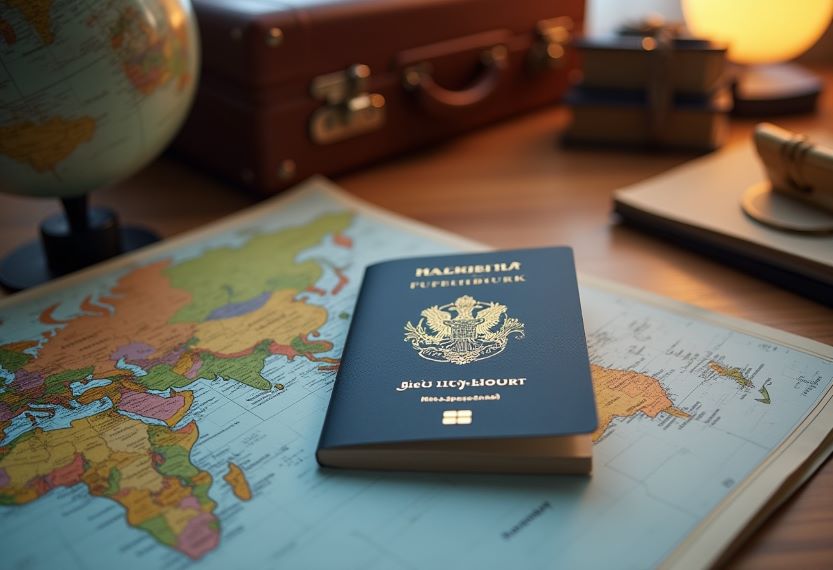Sunday, July 27, 2025
The Luxembourg passport has held on to its position as one of the world’s most powerful passports, holding the fourth position in the prestigious 2025 Henley Passport Index. Luxembourg along with Austria, Netherlands, Portugal, Belgium, Sweden And Norway share this global position. This ranking evaluates passports based on the number of countries their holders can access without requiring a visa, places Luxembourg along with six other countries who jointly share the fourth place.
Luxembourg’s Strong Global Position
The Henley Passport Index is an annual ranking compiled by Henley & Partners, a global leader in migration advisory services. The index ranks passports on basis of the number of destinations a country can access visa-free or with a visa on arrival. It uses official data from the International Air Transport Association (IATA), one of the most credible sources for information on global travel.
As per 2025, Luxembourg shares the fourth position jointly with six other European nations: Austria, Belgium, Netherlands, Norway, Portugal, and Sweden. These countries all offer visa-free or visa-on-arrival access to 188 countries. Although this marks a slight dip from Luxembourg’s previous score of 191 destinations, it still represents one of the most privileged passport rankings globally.
Global Passport Rankings
At the top of the Henley Passport Index for 2025 is Singapore, holding the first place with visa-free access to 193 destinations, albeit down from 195 earlier in the year. Singapore’s passport continues to hold the distinction of offering the greatest level of global mobility.
Following Singapore, Japan and South Korea share the second place, with access to 190 countries. A total of seven European Union nations occupy third place, each offering access to 189 countries: Germany, Spain, Italy, Ireland, France, Finland, and Denmark. Luxembourg’s position in the top four reflects its robust diplomatic relationships and the mobility benefits afforded by its membership in the European Union, which facilitates ease of travel within Europe.
Meanwhile, the United Kingdom and the United States, once the top two holders of passport power, have seen declines in their rankings. The UK passport, which ranked number one in 2015, now holds sixth place with access to 187 destinations. The US passport, which topped the rankings in 2014, has fallen to tenth place, with access to just 182 countries. These drops in rank have raised concerns about the long-term strength of these passports, especially in light of political and immigration policy shifts in these countries.
Factors Behind the Decline of Major Global Powers
The decreasing strength of passports from the United Kingdom and the United States is reflective of broader trends in global travel. In recent years, both countries have adopted increasingly inward-looking policies, which have impacted their diplomatic relationships and global mobility. For example, the United States has faced growing resentment and scrutiny over its immigration policies, and the UK has been dealing with the after effects of Brexit, which has complicated its access to the European Union’s internal travel agreements.
Dr. Juerg Steffen, CEO of Henley & Partners, commented on this decline, noting that the changes are reflective of broader global trends. He says that as the US and UK are adopt increasingly inward-looking policies, one sees a marked rise in interest from their citizens in seeking greater global access and security. This shift has driven the demand for alternative residence and citizenship options, with Americans and Britons now among the largest groups seeking second citizenship or residence permits in countries with more favorable travel conditions.
Luxembourg’s Continued International Influence
Despite the slight regression in Luxembourg’s ranking, the country’s passport continues to be a powerful document for its citizens. Luxembourg nationals can travel freely to 188 countries, a privilege that offers substantial advantages for business, tourism, and international diplomacy. Luxembourg’s global diplomatic and economic ties, and that with other EU countries also contribute to its standing, ensuring that its citizens retain a high level of international mobility.
The minor decline in Luxembourg’s passport score, from 191 to 188, is primarily due to the changes in global visa requirements and international relations. While this may slightly affect the flexibility of Luxembourg nationals in certain regions, the overall mobility which this passport offers, remains among the best in the world.
Implications for Global Mobility
The Henley Passport Index underscores the critical role of global diplomacy and international cooperation in determining the strength of a passport. Countries with active diplomatic engagement and strong international agreements benefit from greater visa-free access, as shown by Luxembourg’s high ranking. For Luxembourg nationals, this means they can enjoy seamless travel to key global destinations for business, tourism, and personal matters.
The continued strength of the Luxembourg passport also reflects the Grand Duchy’s broader commitment to maintain open and cooperative relationships with other nations. As international travel becomes increasingly interconnected, maintaining robust diplomatic relationships and multilateral agreements will be key to ensuring that Luxembourg continues to enjoy one of the most powerful passports globally.
Conclusion
Luxembourg remains a top contender in the global passport rankings, with its robust passport strength at the fourth position in the 2025 Henley Passport Index. While the slight decline in access to 188 countries from 191 in the previous ranking is notable, Luxembourg still continues to offer one of the most powerful travel documents in the world. As geopolitical crosswinds and evolving visa policies impact global mobility, Luxembourg’s position underscores the importance of maintaining strong international relations and diplomatic ties to secure continued freedom of travel for its citizens.
